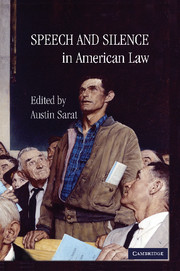Book contents
- Frontmatter
- Contents
- Contributors
- Acknowledgments
- Introduction: Situating Speech and Silence
- 1 “Our Word Is Our Bond”
- Comment on Chapter 1 Our Word (or the Lack Thereof) Is Our Bond: The Regulation of Silence under Contract Law
- 2 Powell's Choice: The Law and Morality of Speech, Silence, and Resignation by High Government Officials
- 3 Anonymous: On Silence and the Public Sphere
- 4 Freedom of Expression, Political Fraud, and the Dilemma of Anonymity
- 5 Speech, Silence, the Body
- Index
Comment on Chapter 1 - Our Word (or the Lack Thereof) Is Our Bond: The Regulation of Silence under Contract Law
Published online by Cambridge University Press: 04 August 2010
- Frontmatter
- Contents
- Contributors
- Acknowledgments
- Introduction: Situating Speech and Silence
- 1 “Our Word Is Our Bond”
- Comment on Chapter 1 Our Word (or the Lack Thereof) Is Our Bond: The Regulation of Silence under Contract Law
- 2 Powell's Choice: The Law and Morality of Speech, Silence, and Resignation by High Government Officials
- 3 Anonymous: On Silence and the Public Sphere
- 4 Freedom of Expression, Political Fraud, and the Dilemma of Anonymity
- 5 Speech, Silence, the Body
- Index
Summary
In “Our Word Is Our Bond,” Marianne Constable describes various ways in which the laws of the United States govern (or attempt to govern) the happenings of speech in today's world. In particular, Professor Constable examines the regulation of speech in the areas of contract law, criminal law, First Amendment law, civil and criminal procedure, evidence law, and torts. In this article, I will further explore law's struggle to govern speech or, more accurately, silence, in one area of contract law – misrepresentation – as illustrated by the seminal case Hill v. Jones.
Our Word Is Our Bond
According to Professor Constable, an agreement, like an oath, may not be considered valid unless certain requirements are met: “certain accepted conventional procedures that include the uttering of certain words must be met; the procedures must be carried out by the appropriate persons, correctly and completely, in the appropriate circumstances; and if particular feelings or thoughts are required, the parties must have those feelings and thoughts, and subsequently follow through with their conduct.” She notes that
[t]he modern law of obligations or contract law confirms
the view of the Hippolytus that human speech acts are
problematic happenings that bind mortals in a world that is neither moral nor accurate. Contract law attempts to
address some of the injustices that beset humans and their
speech acts but does not completely do so.
- Type
- Chapter
- Information
- Speech and Silence in American Law , pp. 39 - 47Publisher: Cambridge University PressPrint publication year: 2010

